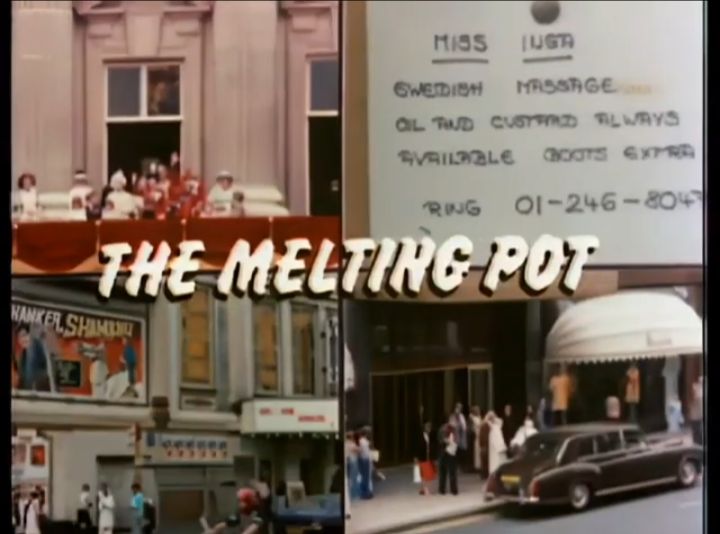The Melting Pot (found BBC sitcom; 1975)
The Melting Pot was a British sitcom TV series starring Spike Milligan that was produced by the BBC in 1975. In the decades since its production, the series has become notorious for the fact that only one of its seven produced episodes was ever broadcast, with the remaining six episodes never being officially released due to the unfunny and racist nature of the series' content.
Premise
The series starred Spike Milligan and John Bird (both in brownface) as Mr. Van Gogh and Mr. Rembrandt, a father and son pair of Pakistanis who illegally immigrate from Amsterdam to the UK by rowing boat before later hitching a ride into London in the back of a lorry advertising Yorkshire puddings. The pair arrive in a district of London known as the "Melting Pot", and find accommodation in the fictional Piles Road, in a boarding house run by Irish Republican coalman Paddy O'Brien (Frank Carson) and his voluptuous, South African-raised daughter Nefertiti Skupinski (Alexandra Dane).
The Pakistanis quickly mix themselves in with the diverse medley of residents and visitors in the boarding house, including Luigi O'Reilly (Wayne Brown), a black Yorkshireman, Eric Lee Fung (Harry Fowler), a Chinese cockney who specializes in selling illicit goods, Richard Armitage (John Bluthal), an Orthodox London Jew, Colonel Grope (Robert Dorning), an alcoholic and racist ex-officer of the Indian army, Bluey Notts (Bill Kerr), a crude and racist Australian bookie's clerk, and Sheik Yamani (Anthony Brothers), a Muslim Arab who speaks with a Scottish accent as a result of working at the Peckham branch of the Bank of Scotland.
History
The series was the creation of Spike Milligan and his regular collaborator Neil Shand and was written with the intent to ridicule discrimination and highlight the ignorance behind such issues (in a similar vein to Curry and Chips, a previous sitcom starring Spike Milligan that also featured him in brownface playing a Pakistani character).
The pilot episode was produced in early 1975 and broadcast on June 11th of that year as an episode of Comedy Playhouse, a British anthology series that had previously served as the springboard for several successful British sitcoms, including Steptoe and Son, Are You Being Served?, and Last of the Summer Wine among others. This high-profile showcase resulted in a full series order for The Melting Pot, with a further six episodes being filmed in August. However, despite all seven episodes being fully completed, the BBC would later quietly drop plans to air the remaining six, and would never acknowledge the series again.
No official reason for this decision has ever been given, but various explanations have been offered by different parties in the years since. Milligan himself believed that it was due to the series being insufficiently funny, and because of cast changes made between the pilot and the six remaining episodes. However, consensus among most others is that the race-based humor of the series was what ultimately led to its downfall.[1]
Curry and Chips, despite its supposedly anti-racist message, had managed to draw criticism for being very racist itself, with much of the series' humor relying heavily on racial abuse and Milligan's incredibly caricatured portrayal of a Pakistani character. As such, Curry and Chips proved to be a highly controversial program, with parent network ITV receiving many complaints from offended viewers and the Race Relations Board, resulting in the program being cancelled after just one series of six episodes.[2] The pilot of The Melting Pot had also garnered criticism for its racist content (with a review in The Observer describing it as “the worst thing to happen to race relations since Pharaoh went sour on the Israelites”),[3] so it is very likely that the BBC was trying to avoid a similar public relations disaster by quietly pulling The Melting Pot from broadcast.[4]
Availability
The pilot episode of The Melting Pot would never be shown again after its single 1975 broadcast, and was subsequently considered lost for many years, with a brief clip in a fanmade showreel of Spike Milligan's filmography being all that had surfaced from it. However, the full pilot would later be uploaded online on March 22nd, 2023 by YouTube user Stanley Moon.
However, the remaining six episodes of the series had likewise never been publicly shown, and as a result, no footage or stills from them were considered likely to ever surface. The only material from these episodes that had been made available were their scripts, which were published in a book in 1983 that can still be found and purchased online with relative ease.[5]
A full copy of the pilot episode of The Melting Pot was known to exist within the BBC archives as a low-band U-matic video recording,[6] and it could be assumed that archived copies of the remaining episodes also existed in some form as well. Unfortunately it did not seem likely that the public would ever gain access to them, given the that their problems as already described had only become more relevant in the ensuing years.
However, at some point the BBC - or at least, an employee with access to the archives - must have relented, since on October 22nd, 2022, Internet Archive user ptiv uploaded copies of all seven of The Melting Pot's episodes to the website, rendering the entire series found.
List of Episodes
| # | Air Date | Status |
|---|---|---|
| Pilot | Jun 11th, 1975 | Found |
| 1 | Unaired | Found |
| 2 | Unaired | Found |
| 3 | Unaired | Found |
| 4 | Unaired | Found |
| 5 | Unaired | Found |
| 6 | Unaired | Found |
External Links
References
- ↑ Archived page on the BBC's website about The Melting Pot. Retrieved 28 Jul '22
- ↑ Archived page on the British Sitcom Guide about Curry and Chips. Retrieved 28 Jul '22
- ↑ From TV's crown jewels to racist nightmares: can the 1970s sitcom be saved?. Retrieved 28 Jul '22
- ↑ Page on Screenonline's website about the history of race in British sitcoms that mentions The Melting Pot. Retrieved 28 Jul '22
- ↑ Goodreads page for the Melting Pot script book. Retrieved 28 Jul '22
- ↑ Page for The Melting Pot on the website of media preservation organisation Kaleidoscope. Retrieved 28 Jul '22

